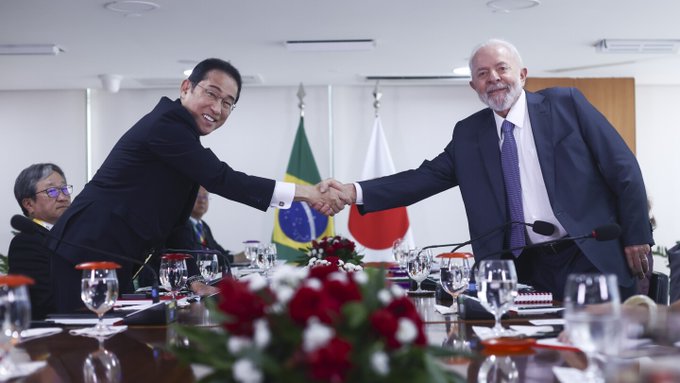In a bid to bolster bilateral ties and culinary diplomacy, Brazil’s President Luiz Inácio Lula da Silva extended a warm welcome to Japan’s Prime Minister Fumio Kishida during his inaugural visit to the country. The leaders convened in Brasilia, Brazil’s capital, where President Lula seized the opportunity to advocate for the inclusion of Brazilian beef in Japan’s market.
The meeting was pivotal for Brazil, which has been striving to secure access to Japanese markets for its beef since 2005. President Lula, during a press conference, urged Prime Minister Kishida to indulge in a steakhouse experience in Sao Paulo, emphasizing the potential benefits of importing Brazilian beef.
“I don’t know what you had for dinner last night,” remarked President Lula, addressing Prime Minister Kishida and the Japanese delegation, while emphasizing the need for culinary exploration. “Please, take Prime Minister Fumio to eat steak at the best restaurant in Sao Paulo so that, the following week, he starts importing our beef.”
“Our meat is cheaper and of better quality than the meat you buy. I don’t even know the price, but I’m sure ours is cheaper, and of extreme quality,” Lula
Under Lula’s leadership, Brazil has intensified efforts to export beef globally, with significant success in Asian markets. Since Lula assumed office in 2023, 50 countries have lifted restrictions on Brazilian beef imports, with Asia being a primary destination. Despite Japan importing 70% of its beef consumption, predominantly from the U.S. and Australia, Lula emphasized Brazil’s superior quality and competitive pricing.
“Our meat is cheaper and of better quality than the meat you buy. I don’t even know the price, but I’m sure ours is cheaper, and of extreme quality,” asserted President Lula.
In 2023, Brazil exported over 2 million pounds of beef, reinforcing its position as the world’s leading beef exporter to more than 90 countries. Improved sanitary conditions in the cattle industry, particularly in areas free from foot-and-mouth disease, have bolstered Brazil’s export prospects.
However, the cattle industry’s expansion poses environmental challenges, notably in the Amazon rainforest and the Cerrado region. In a show of commitment to environmental stewardship, Japan pledged support for restoration initiatives in the Cerrado’s degraded areas. The bilateral discussions also encompassed cybersecurity cooperation and investment promotion.
Prime Minister Kishida emphasized the potential for joint efforts in addressing global challenges, highlighting collaboration in environmental protection, climate change, and sustainable development. Japan’s recent $3 million contribution to Brazil’s Amazon rainforest protection fund underscores this commitment.
During their meeting, Prime Minister Kishida expressed solidarity with the victims of floods in Rio Grande do Sul, demonstrating empathy towards Brazil’s domestic challenges.
With over 2.7 million Japanese citizens and descendants, Brazil hosts the largest Japanese community outside Japan, fostering deep cultural ties between the two nations. Prime Minister Kishida’s itinerary includes engagements in Paraguay before returning to Brazil for further interactions with the Japanese community and business leaders in Sao Paulo.
Prime Minister Kishida’s visit marks a significant milestone in Japanese-Brazilian relations, laying the groundwork for enhanced cooperation across various domains, from culinary exchanges to environmental conservation efforts.



